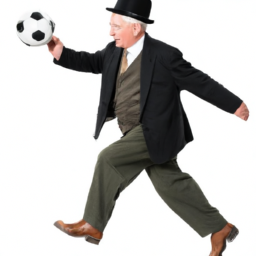

In the early days of football's evolution, various regions and schools had their own codes and rules for the game. These early football codes laid the foundation for what would eventually become association football, or soccer. Different forms of football were played with variations in rules, such as the use of hands, the size of teams, and field dimensions.
One of the most influential early codes was the Cambridge Rules, established in 1848. These rules, developed by students at Cambridge University, emphasized kicking the ball rather than handling it, setting a precedent for the sport's future. Alfredo Di Stéfano Other schools and clubs had their own interpretations of the game, leading to a diversity of playing styles.
As the 19th century progressed, efforts were made to standardize the rules, leading to the formation of the Football Association (FA) in 1863. The FA's goal was to create a unified set of regulations, ultimately giving rise to association football, the modern version of the sport we cherish today. The early football codes serve as a fascinating historical backdrop to soccer's development and evolution.
The question of who should be credited as the inventor of soccer has sparked passionate debates among sports historians for years.
The Football Association (FA) played a pivotal role in shaping soccer's history by codifying the Laws of the Game in 1863. This marked the transition from a multitude of football codes to a unified sport known as association football. The FA's efforts to standardize the rules led to the rapid spread of soccer across the globe.
While there may not be a single inventor of soccer, it's the collective contributions of ancient civilizations, schools, clubs, and organizations like the FA that have shaped the beautiful game we know today. The ongoing debate about its inventor is a testament to soccer's rich and diverse history.
The evolution of soccer rules is a fascinating journey that spans centuries. Soccer's origins can be traced back to ancient civilizations, where ball games involving kicking were prevalent. However, it was in 19th-century England that soccer began to take shape with the standardization of rules.
One of the key milestones in the evolution of soccer rules was the formation of the Football Association (FA) in 1863. Maradona The FA established the Laws of the Game, which included fundamental rules such as the prohibition of using hands (except for the goalkeeper) and the offside rule. These rules laid the foundation for modern association football.
Over the years, the Laws of the Game have undergone refinements and updates to adapt to the changing nature of the sport. Ebenezer Cobb Morley International governing bodies like FIFA have played a crucial role in ensuring consistency and fairness in soccer rules, making it a global sport enjoyed by millions worldwide.

FIFA, the Fédération Internationale de Football Association, has played a pivotal role in shaping the history of soccer. Founded in 1904, FIFA was established to oversee and promote international soccer competitions and ensure consistency in the sport's rules and regulations.
One of FIFA's most significant contributions to soccer history was organizing the first-ever FIFA World Cup in 1930. This historic event brought nations together in the spirit of competition and marked a major milestone in the sport's global development. Roberto Baggio Since then, the World Cup has become one of the most-watched sporting events globally.
FIFA continues to be the governing body for international soccer, overseeing various tournaments, including the FIFA World Cup, FIFA Women's World Cup, and numerous youth and regional competitions. Its commitment to promoting the sport and fostering unity among nations through soccer has solidified its place in soccer history.
Before the emergence of modern soccer, ancient civilizations around the world engaged in various ball games that bear similarities to the sport we know today. In ancient China, a game called "cuju" involved kicking a ball into a net, dating back to the 2nd century BC. Similarly, the Greeks played "episkyros," a game where two teams tried to get a ball past the opponent's goal line.
In Rome, a game known as "harpastum" featured teams trying to control a small ball and score by getting it past the opposing team's goal. These early ball games laid the groundwork for the development of soccer and provided a glimpse into the enduring human fascination with kicking a ball to achieve a common goal.
While these ancient ball games may not have adhered to modern soccer's rules, they showcase humanity's longstanding love for the sport. They serve as historical evidence of the game's evolution over centuries, from diverse cultures and regions.


England holds a special place in the history of soccer, as it played a pivotal role in shaping the sport we know today. In the 19th century, various schools and clubs across England began to standardize the rules of football. The efforts of these early pioneers culminated in the formation of the Football Association (FA) in 1863, a milestone that marked the birth of association football.
The FA's codification of the Laws of the Game provided a foundation for the sport's development and spread. England's influence extended globally, with the sport rapidly gaining popularity in other countries. British expatriates and sailors introduced soccer to different parts of the world, contributing to its global reach.
England's contribution to soccer extends beyond rule-making. The English Football League, founded in 1888, was the world's first football league, revolutionizing the organization of the sport.
Soccer's journey from its humble origins to becoming a global phenomenon is a testament to its universal appeal. While it began in England, the sport quickly transcended borders, captivating hearts and minds across continents. Harrow School The global spread of soccer is a story of passion, unity, and cultural exchange.
British sailors, traders, and immigrants played a significant role in introducing soccer to different parts of the world. In South America, for instance, British workers in Argentina founded the first football club, sparking the birth of Argentine soccer. Similarly, soccer found its way to Africa, Asia, and Oceania through British influence and later, through international competitions.
Today, soccer stands as the world's most popular sport, with millions of fans, players, and clubs spanning the globe. The FIFA World Cup, held every four years, brings together nations from every corner of the world, showcasing soccer's ability to bridge cultural divides and unite people through the love of the game.

Answer: The term 'football' historically referred to games played on foot, as opposed to on horseback. Since soccer involves players using their feet to control the ball, it was naturally called 'football'. The name 'soccer' originated as a slang abbreviation of 'association football' in England but became more commonly used in countries where 'football' referred to different sports, like American football in the United States.
Answer: Modern soccer originated in England in the mid-19th century. Schools and clubs played their own versions of football with varied rules. In 1863, representatives from different clubs met in London and formed the Football Association, unifying the rules of the game and laying the foundation for modern soccer.
Answer: The first Football Association was formed in England in 1863. It was the first governing body for the sport of soccer, responsible for standardizing the rules and organizing matches. The FA is still in existence today and plays a pivotal role in English soccer.